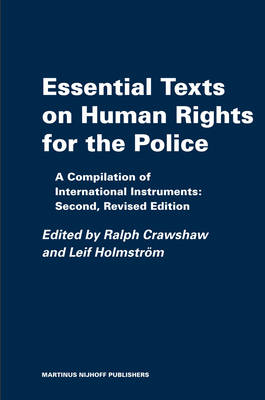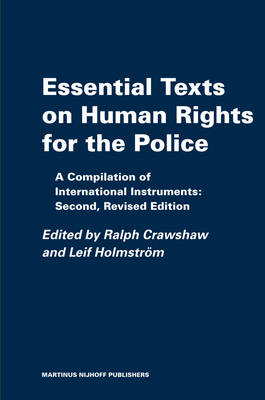
- Retrait gratuit dans votre magasin Club
- 7.000.000 titres dans notre catalogue
- Payer en toute sécurité
- Toujours un magasin près de chez vous
- Retrait gratuit dans votre magasin Club
- 7.000.0000 titres dans notre catalogue
- Payer en toute sécurité
- Toujours un magasin près de chez vous
Essential Texts on Human Rights for the Police
A Compilation of International Instruments: Second, Revised Edition
305,45 €
+ 610 points
Description
Human rights law protects the rights and freedoms of individuals and groups within societies. Police officials are uniquely placed to ensure respect for, and secure protection of, those rights and freedoms. Those who exercise power on behalf of the people they serve need to be aware of the human rights standards they are required to meet, and the best practice in their fields of activity. The texts identified as essential for the police in this publication serve as a valuable aid to meeting both of these needs. In a democracy governed by the rule of law, good policing is crucially dependent upon compliance with the standards they embody. Furthermore, these standards, which protect human rights and set out good professional practice for police, lie at the core of democratic policing.
Essential Texts on Human Rights for the Police is divided into three parts, each one with an introduction outlining the scope and contents of the instruments. Part I includes the Universal Declaration of Human Rights and universal treaties, Part II regional treaties and Part III non-treaty instruments. In all, 36 international instruments are reproduced.
The present publication is intended to be used in human rights education and training programmes for police and other officials exercising police powers. It can be used by teachers and resource persons as a principal source of reference for such programmes or as a supplement to teaching manuals. It can also serve as a source of reference and guidance to operational police officials and to anyone wishing to be aware of the standards to which police should adhere.
This second, revised edition of Essential Texts on Human Rights for the Police is more comprehensive than the first and includes 14 treaties and non-treaty instruments not reproduced in the previous edition of the book. It is a companion volume to Essential Cases on Human Rights for the Police: Reviews and Summaries of International Cases, by the same authors.
Essential Texts on Human Rights for the Police is divided into three parts, each one with an introduction outlining the scope and contents of the instruments. Part I includes the Universal Declaration of Human Rights and universal treaties, Part II regional treaties and Part III non-treaty instruments. In all, 36 international instruments are reproduced.
The present publication is intended to be used in human rights education and training programmes for police and other officials exercising police powers. It can be used by teachers and resource persons as a principal source of reference for such programmes or as a supplement to teaching manuals. It can also serve as a source of reference and guidance to operational police officials and to anyone wishing to be aware of the standards to which police should adhere.
This second, revised edition of Essential Texts on Human Rights for the Police is more comprehensive than the first and includes 14 treaties and non-treaty instruments not reproduced in the previous edition of the book. It is a companion volume to Essential Cases on Human Rights for the Police: Reviews and Summaries of International Cases, by the same authors.
Spécifications
Parties prenantes
- Editeur:
Contenu
- Nombre de pages :
- 532
- Langue:
- Anglais
- Collection :
- Tome:
- n° 8
Caractéristiques
- EAN:
- 9789004164819
- Date de parution :
- 27-03-08
- Format:
- Livre broché
- Format numérique:
- Trade paperback (VS)
- Dimensions :
- 160 mm x 240 mm
- Poids :
- 850 g

Les avis
Nous publions uniquement les avis qui respectent les conditions requises. Consultez nos conditions pour les avis.





